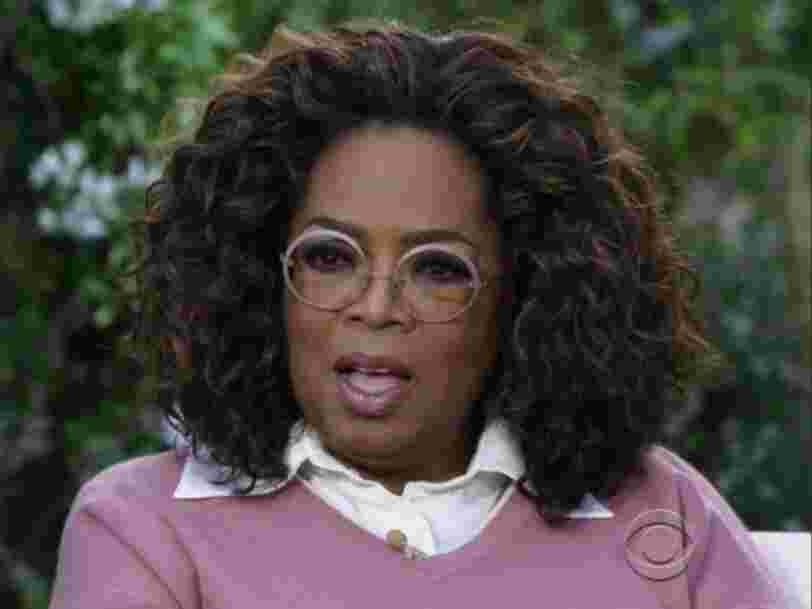Oprah's interview with Prince Harry and Meghan Markle didn't just expose the royal family - it also revealed just how the broken US healthcare system is
Manny Fidel | Publié le | Mis à jour le- Opinion
-
Recevoir tous les articles sur ce sujet.
Vous suivez désormais les articles en lien avec ce sujet.
Voir mes sujets suivisCe thème a bien été retiré de votre compte

- Oprah interviewed Prince Harry and Meghan Markle in a highly anticipated CBS special.
- Viewers from the UK were shocked by how many pharmaceutical ads ran during the American broadcast.
- Their medical costs are covered by the government, and their reactions expose how broken the US healthcare system is.
- This is an opinion column. The thoughts expressed are those of the author.
- Visit the Business section of Insider for more stories .
In the year since Prince Harry and Meghan Markle stepped down from their official duties as extensions of the British monarchy, scandalous, albeit unverified accusations came about from either side of the conflict. It all culminated in the royal couple's primetime interview with Oprah, which revealed allegations of racism and abuse.
While the interview exposed the royal family's callous treatment of Harry and Meghan, the conversation it drove online inadvertently exposed how broken the US healthcare system is. The interview aired from 8 pm to 10 pm Eastern in the United States, meaning that UK residents had to stay awake until the early morning hours to watch. As they did so, they became shocked and concerned by the existence of something Americans consider normal: a swarm of pharmaceutical ads.
"watching american adverts during the megan and harry oprah interview is so surreal, why are so many of them for meds?" tweeted one UK-based viewer.
"HELP why are all american ads about medicines??" tweeted another.
The answer is just as ridiculous as the existence of the ads themselves. The United States' healthcare system was constructed on the idea of making money. Helping sick people is just a side effect.
Money is the motive
It's easy to forget just how messed up the US healthcare system is - we Americans have lived with it our whole lives, which makes it "normal" - but the reaction to pharmaceutical advertisements by people living in Europe illustrate just how convoluted the American arrangement is.
"American adverts make me feel like I'm in some post-apocalyptic world" one viewer tweeted .
That's because in the UK, the vast majority of people's healthcare is administered by the National Health Service (NHS). When you get sick, you go to the doctor and are cared for at no cost "at the point of use, " meaning that the service itself is subsidized by taxes, but the actual care is free. If you are sick, you go to the doctor and are treated at no cost. If you have an accident, you are delivered to the hospital and operated on at no cost.
You don't need insurance in the UK because it is provided through the NHS. Some supplemental insurance can be added, but only 10.5% of UK residents have that extra insurance.
Since the government is the almost exclusive buyer of medicines, the NHS negotiates a rate that it pays pharmaceutical companies and then provides the medicines to NHS users. Therefore, there's no reason for pharma companies to aggressively advertise, and, in fact, these types of direct-to-consumer pharmaceutical ads are banned in the UK .
In America however, pharmaceutical companies are competing to win over consumers and drive up their profits. Instead of having a nonprofit government entity to negotiate on their behalf, average Americans either have to fend for themselves or rely on insurance companies - who are also profit-driven - to negotiate the price for them.
That's also where the ads come in. There are often multiple, competing brands of any given medication, so drug ads are designed to drive people towards more expensive name brand drugs and push people to try drugs they may not need. All of this is moot in a UK-style system where the government does the negotiating with drug companies.
The results of the profit-driven US model are devastating. Let's use diabetes type 1 for example, a condition where the body can't make enough insulin, which causes high blood pressure and affects more than 1 million Americans.
There are three competing insulin manufacturers in the US, the lack of competition and ability to negotiate for higher profits has in turn driven the cost of insulin so high that people are engaging in "insulin rationing," or using less insulin than they should be, to make the doses last longer. This sort of rationing has led in some cases to death . The Twitter user above may have been joking when they described this as "post-apocalyptic," but a system where it's necessary to ration anything you need to live fits pretty squarely into that definition.
Meanwhile, the pharmaceutical industry raked in $1.3 trillion , with a "t," in 2019.
And on top of these drug costs, American also have to deal with soaring insurance premiums and high, uncertain costs for basic needs, like ambulances .
It makes sense how dumbfounded UK viewers were when they saw American commercials for medication. They live in a system that doesn't penalize you for something you cannot control.
The need for an American universal healthcare system, like Medicare For All, only intensifies with time. As long as our healthcare system prioritizes profit over people, we will continue to look ridiculous to the rest of the world.
Inscrivez-vous gratuitement à notre newsletter quotidienne
Via PakApNews